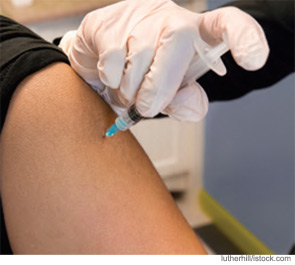“There are some primary care physicians who still will agree with families that it’s okay not to get them,” Dr. Zacharisen said. “It’s sometimes not getting through to the physicians, and if it doesn’t get through to the physicians, it’s not going to get through to the children and the families.”
Explore This Issue
July 2010There is some disagreement among otolaryngologists about the role they should play in promoting use of the vaccine.
“We should be encouraging our patients to have the vaccine or at the least making the parents aware of it,” said Farrel Buchinsky, MD, assistant professor of surgery at Drexel University College of Medicine, whose research includes the anti-HPV immune response in people with RRP, including those who had the HPV vaccine. “Primary prevention is not usually the role of the specialist, but that does not mean we cannot talk to parents of our ‘tweener’ patients about the vaccine.”
Dr. Buchinsky said otolaryngologists should also point out that the Merck vaccine is the only one that targets the HPV strains that cause RRP.
Dr. Derkay said that, at this point, he would hesitate to promote the vaccine for uses other than prevention of some types of cervical cancer.
“Until there is more science behind the vaccine’s efficacy for RRP, I would be reluctant, off label, to push the vaccine to the public,” he said, adding that he would encourage the use of Gardasil over Cervarix.
Douglas Lowy, MD, chief of the Laboratory of Cellular Oncology, part of the National Cancer Institute, said the resistance to vaccinations is a cultural hurdle that has to be overcome. “As a country, we don’t vaccinate particularly well when it comes to adolescent vaccines that are not required,” he said, pointing out that he was speaking for himself and not for the government agency.
Dr. Lowy said there might be more widespread use of the vaccine if it could almost completely eliminate the risk of cervical cancer, but the Merck vaccine doesn’t cover strains that cause about 30 percent of cervical cancer cases. “The vaccine is not perceived by some people as much of an advance as it might be if you could basically eliminate the risk of cervical cancer,” he said. “My own feeling is that a second-generation vaccine that has a broader efficacy is more likely to have a dramatic impact.”
But Dr. Buchinsky said he is not so sure the extra coverage would make much of a difference. “I doubt that the public and primary care doctors are going to have more acceptance just because it has a higher prevention rate,” he said. “The current vaccine’s likely cervical cancer prevention rate is pretty darn good.”

Leave a Reply